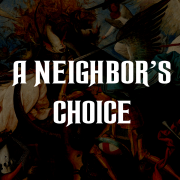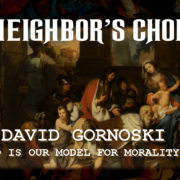Against Masks: Not Hindering Our Personal and Relational Connection With Others
This article originally appeared on The Aquila Report.
There is much talk these days about requiring people to wear masks as a condition for reopening states, businesses, and churches. This is said to be part of the “new normal” that we are to expect and accept without question. I would like to suggest that this practice, if widely implemented, would have a dehumanizing effect on us as persons.
For the ancient Greeks, the word person (prosopon) anatomically referred to the part of the body below the cranium and above the neck. In other words, it referred to the face. However, for Greek dramatists such as Sophocles, Euripides, and Aeschylus the word person (prosopon) increasingly came to be associated with the mask worn by the actors. This led to a strong correlation between the word person and the word mask making them virtually synonymous.
In Rome, the Latin word for person (persona) essentially followed the Greek usage. The Latin word denoted the different roles a person would play in society or the theater. A persona was not the person himself, but rather an add-on or an appendage to one’s identity.
So, for both the Greeks and the Romans the word person referred to the role one played in either the theater or the society. It was something external to one’s true identity. In short, a person was a mask.
All of this, of course, begs the question: how did the word person come to be associated with one’s true identity?
The answer is complicated, but the abridged version is that the modern usage of the word person comes from biblical Christianity. Its theological and philosophical underpinnings come to us by way of the Cappadocian Fathers, especially Basil, the bishop of Caesarea in Asia Minor.
The etymology is as fascinating as it is important. My immediate concern, however, is that our direction is about to be reversed, and we will return from whence we came. The Cappadocian Fathers made the etymological pilgrimage from mask to person, but as we transition into the post-pandemic age we may be journeying back toward the original Greco-Roman understanding of a person as a mask.
There is much talk these days about requiring people to wear masks as a condition for reopening states, businesses, and churches. This is said to be part of the “new normal” that we are to expect and accept without question. I would like to suggest that this practice, if widely implemented, would have a dehumanizing effect on us as persons.
Wearing masks en masse, whether voluntarily or by way of compulsion, will ultimately diminish us as persons. It will dramatically change our behavior towards others. It will radically alter the way we relate to each other.
Concealing our faces, will encourage us to look at others with suspicion. Our neighbors will be perceived as something to protect ourselves from, rather than someone with whom I commune, eat and drink with. If you doubt this just remember that a medical mask is called personal protection equipment.
Also, inherent in mask wearing is the tendency to perceive others as a threat, or at the very least, as a potential threat. Masks suggest that others should be feared, rather than embraced. Hiding our faces encourages us to distrust everyone as a potential enemy rather than a potential friend.
Covering our faces will inhibit our communication. Fifty-five percent of communication is non-verbal, and much of our non-verbal communication is facial expression. Covering up two-thirds of our face will rob us of vital nuances necessary for real communication. A smile or a frown has enormous power. There are said to be at least seven universal facial expressions that communicate a person’s emotions: happiness, disgust, anger, fear, sadness, surprise, and contempt. These emotional expressions often occur at lighting speed and are sometimes more capable of deeper communication than our verbal speech. The absence of these facial expresses would greatly diminish us as human beings.
More importantly, wearing masks will have a negative impact on our worship. Imagine baptism with masks, or the Lord’s supper with masks, or sermons and singing with masks. At the very least, the obvious awkwardness would greatly distract us from the seriousness, solemnity, and joy that should accompany participating in the sacraments and other elements of worship.
Earlier I stated that my immediate concern was that donning masks would return us to an understanding of the human person similar to that found in the Greek and Roman theater and society. In the theater, the actor fights against the gods and fate. In his rebellion he briefly tastes freedom, and senses what it feels like to be a person. But in the end his fight is tragic. He can neither escape his fate nor triumph over the gods and he realizes that his person is nothing but a mask.
If our putting on a mask is actually nothing more than a new kind of virtue signaling of our own personhood it, too, will end tragically, and we will realize that this person is nothing but a mask. If reopening the states, businesses, and churches is contingent on wearing a mask we will unwittingly create two classes of people. Those who wear masks and those who don’t. The former will be characterized as people who really care for the safety and welfare of their fellow human beings while the latter will be vilified as uncaring, dangerous, and disrespectful. This will result in a new form of discrimination.
In addition, it will set a higher bar for participation in worship than either Scripture or the Westminster Standards prescribe. In this way, masking ourselves will move us in the direction of reversing the unifying effects redemption, and put us on the trajectory toward reestablishing the alienation that resulted from the fall.
This would be tantamount to promoting a pathology that is worse than the pandemic.
It is on this basis, and for these reasons, that I am against masks.
Rev. Jim Fitzgerald is a minister in the Presbyterian Church in America and a staff member of Equipping Pastors International.












Trackbacks & Pingbacks
[…] to the podcast below: Read Rev. Jim Fitzgerald’s article on […]
Leave a Reply
Want to join the discussion?Feel free to contribute!